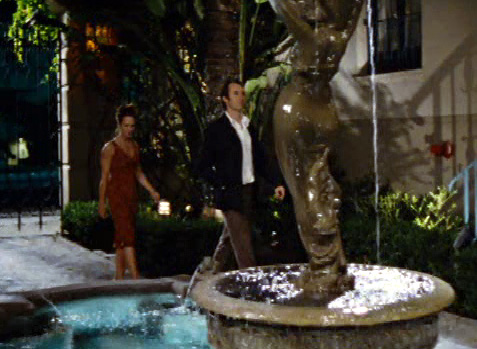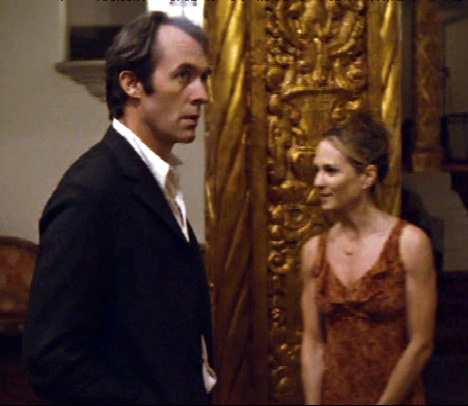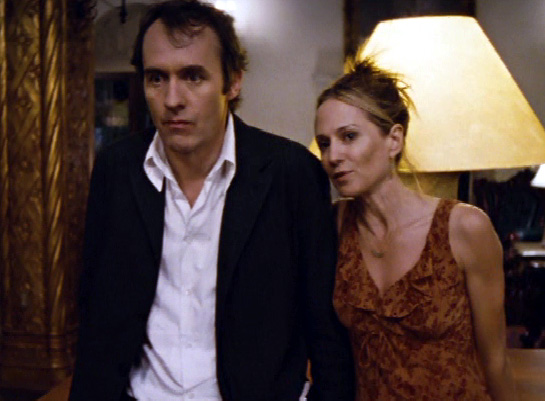

PopEntertainment.com >
Feature Interviews - Actresses
>
Features Interviews F to J > Holly Hunter
 holly hunter
holly hunter
has nine lives
by brad balfour
Copyright ©2005
PopEntertainment.com. All rights reserved.
Posted: October 18, 2005.
In the nine
vignette-composed feature Nine Lives by director Rodrigo Garcia,
Oscar-winning actress Holly Hunter joins an ensemble cast of other
established actors such as Glenn Close and Aidan Quinn, in telling about
the lives of various women at moments of crisis. Since this project had a
scant budget and time constraints, Hunter had to do her performance in
virtually one take--offering her another challenge in a career that has
include such daunting films as The Piano, Thirteen and
Crash.
When you saw Nine Lives assembled, were you amazed at how the
parts fit together?
Yes. There were things that came together. There is both an external and
internal world that prevents these characters from experiencing the
intimacy that they crave. That was made more potent when I saw the movie
put together. It is about people trying to connect and having a difficult
time making that connection. The first scene is so powerful where she's
trying to see her child. You could say that the external world is
preventing her from seeing her child, but she's the one that landed
herself in jail. She caused herself to grapple with these external enemies
that prevent her from the intimacy that she craves. With my character,
it's purely internal. I choose this guy that cannot give me the intimacy
that I want. That's always the case: we sabotage ourselves. That's very
provocative to me.
Did the challenge to do it all in one take to make the character feel
more real put extra pressure on you?
The aspect of doing it in one day shooting was difficult. I embraced it
under duress [laughs]. I would have preferred a more luxurious
time. There is a luxury of time that you truly get to marinate in a
character when you're doing a play. You can really just tread water and
loll in a character's life, but that wasn't included in this process.
What did you take away from the other scenes that helped with yours?
It helped me a lot. One of the reasons why I wanted to play Sonia is
because the temperament of the piece was very different from the other
pieces. Sonia had more of a playful, childlike persona—filled with life
and curiosity. She provided a great foil to the guy she was so attracted
to played by Stephen Dillane who's aloof, cool, English, sophisticated,
withholding, and the kind of man that a woman like that would try to
change. I was entertained by that. That's what I loved about it.
 When did this process originate?
When did this process originate?
It started when I read it. That spark was originated from the first time I
read the story—how different it was from the other stories. There was a
lack of somberness to the story that I really liked. It was more kinetic
and wandering. It had a physical life to it that I felt stimulating. It
was a very incomplete process for me because I only had
two days to work on
it.
Was working with director Rodrigo Garcia a second time helpful in doing
this film?
It was as great as the first. He's just so great. Second-time directors
often lack confidence. This lack of confidence manifests itself in the
chokehold: "I probably can do everybody else's job better than they can
because I have the answers". There's a certain desire to control the film.
Because Rodrigo was a DP and a camera operator before, he's very at home
with the deadline of a movie set. He's very comfortable with that, so he
was very comfortable with giving the actors a chance to be in the driver's
seat.
Do you like the chance of working with a director more than once?
Yes, very much. It's such a drag to not be able to. Directors feel
pressure to originate—it needs to never have been done before. Working
with the same people again, it's not a template anymore.
Do you feel they have a shortcut in getting you into the part?
Yes. There's just an established intimacy and trust that you can't get
otherwise. The only way you can get it is time spent. It's a wonderful
experience that Rodrigo is obviously comfortable with.
Do you feel like you're one of those actresses that can help a small
film get made?
It depends on the size of the movie. A movie like Nine Lives, I
could help. But I did do my own hair and makeup and I wore my own dress
[laughs]. There's a limit to what I can help. David Cronenberg's
Crash was the biggest movie that I could help, but that's because I
just won an Academy award, so the timing was really good. It's nice to be
able to help Thirteen and Nine Lives because I believe in
them when I first read them as fully as anything.
 Was the experience working on Thirteen very different?
Was the experience working on Thirteen very different?
The two directors are so different. The manifestation of both directors is
exemplified by their two movies. Catherine [Hardwicke] is filled with
energy—she is like a thirteen year old. She understands her movie from the
inside out. Rodrigo does, too. But their stories are diametrically opposed
because they are diametrically opposed, too, as people living in this
world. I loved working with both of them for completely different reasons.
Does that influence your choices of roles?
I read everything which is unfortunate because it's probably corrosive to
my brain and to my spirit. If you spend all day reading screenplays,
something happens that's profound and regrettable. Sometimes I want to do
something that they don't want me to; they'd rather have somebody who
means more at the box office. My taste is without category. I don't judge
a script because it's coming from a studio. I read it openly, hoping that
there will be something in there
galvanizing for me.
Is there something consistent in the good choices you've made with your
roles?
There are always unfortunate things. Rodrigo is the prefect example of
that. After his Things You Can Tell Just by Looking at Her came out
at the film festivals, it when straight to Showtime. There are things
about the movie that were just fantastic, worthy of a release. But United
Artists didn't know what they wanted to do with it. There are all these
events that are simply beyond my control. After a while, I understood the
certain limitations of my own contribution to movies as an actress. I've
been very lucky that some of the things that I've decided to dive into
with a group of people have turned out okay.
Do you feel like there are increasingly better roles for women in films
these days?
There are not enough women's roles out there. Not even for twenty
year-olds. As you get older, it gets worse. However, I have
 experienced
some kind of renaissance in terms of the offers I get. Right now, I am
getting more offers. I don't know why. It doesn't make much sense. But,
there is a real ceiling which is rather low for women that get older as
opposed to men who get older. Nobody can argue with that—it's a fact.
experienced
some kind of renaissance in terms of the offers I get. Right now, I am
getting more offers. I don't know why. It doesn't make much sense. But,
there is a real ceiling which is rather low for women that get older as
opposed to men who get older. Nobody can argue with that—it's a fact.
Are you attracted to movies that are not formulaic?
I don't know what comes first in a movie. Distribution is a huge world
that I don't know much about. We've all seen how a movie is distributed
that doesn't have any of those standard qualities. Crash is a good
example because it certainly is not an easy resolvable story nor is it
easy describable. But it did extremely well globally. It's mostly about
how the distributors understand it and release it to the public. For
example, Russian Ark played for nine months at the Cinema Village.
It was extraordinary. It was a coup for the movie that cost very little.
Do you go to directors to suggest them to write a script?
The Coen Brothers are friends of mine, but I've never asked them to do
something. Those guys are so prolific. They do their own thing. If they
ask me to be in a movie, I'll be in it.
Have you considered any comedy roles lately?
There's a movie I did called The Big White where I play a comedic
character. Those kinds of roles are harder to write. It's hard to make me
laugh when I'm reading a script. Very few of them are really funny.
What was your experience like working on the upcoming The Big
White?
Robin Williams is so unbelievably funny at times. There's something about
spending months with him when he goes into phases of being astronomically
funny. It was a pure joy to do that movie. It was really fun.
Would you laugh as much now as when you did with Raising Arizona?
Oh, yeah. Raising Arizona to me was one of the best scripts that
the Coen Brothers have written.
Would you like to do a superhero movie like The Incredibles, but
as live action instead?
If the director were as gifted as Brad Bird then, yeah.
 What filmmakers would you like to work with in the future that you have
not worked with before?
What filmmakers would you like to work with in the future that you have
not worked with before?
Charlie Kaufman is extraordinary. I love everything that he's ever done.
Charlie Kaufman did a reading with Hope Davis and Meryl Streep. It's hard
to comprehend what he's done. I feel the same way about his movies.
Will you be doing theater any time soon?
I was in London
for the first six months of the year doing an English version of Medea.
I love to do plays. They are very challenging.
Did you find your experience in theater beneficial in doing this movie?
I've always done more theater than movies, so theater has certainly helped
me. I found that it helped the other actresses who started in theater. It
did aid them in approaching this project.
Do you see yourself as a producer?
No; that demands reading books, and I can't seem to get away from these
screenplays.